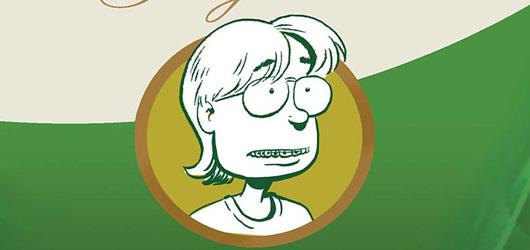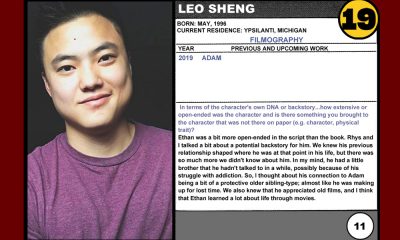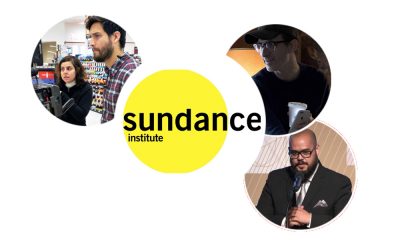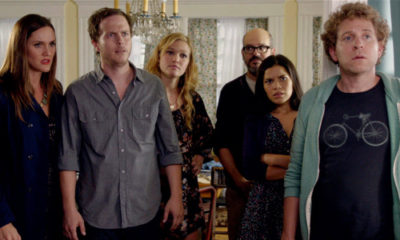Retro IONCINEMA.com
Watch What They Write: Alex Robinson (Too Cool to Be Forgotten)
For the movie adaptation, I’m thinking rather of two different actors for Andy, one to play the adult, the other to play the teenager, and fortunately they’ll look similar. A bit like in Eternal Sunshine of Spotless Mind directed by Michel Gondry, with Jim Carrey and another actor to play him younger.
IONCINEMA.com’s Watch What they Write is a unique monthly feature where we interview the writer – more specifically, the voice behind the original source material. The novelist often creates a world that borrows from the cinematic and vice-versa – it’s not a coincidence that a heavy amount of projects that make it onto the silver screen are based on/adapted from literature. With this feature we hope to bridge the distance between author and his/her original material with what may one day make itself onto the screen. This month we feature: Alex Robinson and his 2008 graphic novel, Too Cool To Be Forgotten.
Time travel machines, teenagers suffering from acne breakouts, and going cold turkey — that’s just the tip of the iceberg in Alex Robinson’s graphic novel Too Cool To Be Forgotten. Optioned for the big screen by Likely Story’s Anthony Bregman (producer of Thumbsucker, Synecdoche, New York), Robinson is cited as one of the most critically lauded American comic book writers due to his true to life portraits (Tricked, Box Office Poison, Lower Region). This coming-of-age story features a 40-year-old man, Andy, who undergoes hypnosis therapy to quit smoking, only to wake up in the body of his 15-year-old self. Since he still has the knowledge of his life to come, he is uncertain whether he can — or should — change anything that could affect the life he hopes to return to 25 years down the road. How did Alex Robinson write it? and how this could move from the page to the big screen is what we’re going to explore below.

Caroline Nataf: Let’s speak about the book, what was the writing process?
Alex Robinson: I love time travels stories, even the bad ones! When I graduated from high school in 1987, it was an important date, the 20 years anniversary of my high school. And I was completely obsessed with this event: as I didn’t know why I was in this state of mind, I’ve decided to examine it, to explore it, to come back to my adolescence.
From that moment, I left a lot of room to play around, to improvise – I didn’t know where I was going to when I’ve started to write. But I’ve never had the idea of writing it like a movie, or for a movie adaptation. My main goal was to create the best comic!
Nataf: All the chapters start with a song reference, there are a lot of independent images interrupting the classical story frame, movie citations also. How would you describe their use in your comic?
Robinson: The idea was to underscore the eighties, to get this time frame. For the songs, I’ve just sorted out a list of the ones which were aired in 1982, 1983, etc, a kind of best of. I’m a big music fan and it was a funny thing to do. In all my books, I put a lot of music, lyrics, I’m creating a silent soundtrack for the reader, it’s giving a special tone and it’s my style. Concerning the movie citations, the matter was to find the movies of this period, that’s why I put Back to the Future, Monty Python, etc.
It is the same process with the drawings breaking down the narrative storyline: it is visually interesting for the reader not to see same faces as it’s usually done in every comic. In this perspective, the writing will come first and the art serves the writing. It is always good to have a good image to illustrate the text with. That’s why I never imagined writing a novel, I don’t think it is suitable for me. For the comics, I’m writing the dialogues and drawing the scenes, I don’t have to describe the scenes…
Nataf: What was your approach to create this world of teenagers, of geeks?
Robinson: For me, high school was a hard time, I didn’t fit in. I was on my own and had to set myself apart. However, often, TV series about teenagers and geeks are written by scriptwriters who want them to be clever, witty, and in real life…we weren’t! So I’m trying to capture the honesty of this age, to draw teenagers as they’re really are, erratic, self conscious, sensitive, and that’s harder.

Nataf: Why did you choose to tell the story from the point of view of an adult Andy?
Robinson: Because I’m an adult writing it! And the central point is Andy’s character as an adult. It would have diminished the story to tell it from the teenage point of view.
For the movie adaptation, I’m thinking rather of two different actors for Andy, one to play the adult, the other to play the teenager, and fortunately they’ll look similar. A bit like in Eternal Sunshine of Spotless Mind directed by Michel Gondry, with Jim Carrey and another actor to play him younger. Otherwise, I often think it didn’t work when you have an actor made younger or older, it seems artificial or badly done. I don’t know really about actors, I don’t know who could be good to play my characters: I’m excited by the fact that an actor I like, is playing and that I could meet him afterwards in real life!
The key part of the story was to draw the accurate teenager. They often act as adults, whereas they’re closer to childhood. So the idea is really to cast real kids, rather than using older characters.
Besides, the movie will be certainly structured differently and I know that the scriptwriter, the production company had the idea of starting the story with Andy as a teenager and you understand later that he’s really an adult. I’m letting them stretch my story! There is no plan for me to be involved in the scriptwriting and my job was to write the comic: afterwards, they do whatever they want with the adaptation, they can dismember my child! The book will be always there, it’s my work, the movie will be something else.
Nataf: How did the hypnosis come as a narrative device?
Robinson: I used the hypnosis for two reasons: first, I was looking for something not especially close to science which could create the time travel, something that doesn’t require a real explanation, something magical; then, it needed to be a real journey for Andy, it needed also to remain unclear if it was in his head or if it was real…. I really wanted to convey a feeling of what happened or not. And I was really surprised when a guy from a hypnosis blog called me to know if I did some research on the subject… but I made everything up! I’ve never done hypnosis, I think I’m too sceptical like my character!
It’s the same thing with the father’s revelation (read the book to know the end!), I made it up, it never happened in my family, but it was really strange when people came to me, saying they lived a similar situation and they were really moved by the way I’ve written it. The only thing I can say, it’s that I’ve always dealt in each of my books with my father issues, in some degree. So, it’s quite emotionally autobiographical for me.
Nataf: What are your movie habits? Does movies influence your work?
Robinson: I do watch a lot of movies, rather in DVDs, than in theatres. The same ones that most of people like! The Godfather, LOTR, etc. I really don’t care about action movies, I’m more into characters, relationships movies. Movies are not a direct influence in my work, I’m absorbing them in a deeper level. When I really like a particular line, which is stuck in my mind, I’m putting it in my book, like a tribute. For my first comic (Box Office Poison published in 2004), I put a lot of references from TV series and shows but I was not really aware of it, until my Spanish publisher sent me a lot of questions from the translator who didn’t understand them! I had to put a glossary in the back, explaining all the jokes… I’m often using pop culture, but I’m trying to shy away from it, because that’s a lazy writing to shorten the thing you want to convey, that’s a quick device to get the audience identifying with the characters, the universe. And it can be tiring so I’ll cut it out myself!
Nataf: How did the deal book option come together?
Robinson: It went through my publisher Top Shelf in United States, the company had the strong will to turn books into movies. The independent movie producer Anthony Bregman from Likely Story expressed interest in the book, and even became a Top Shelf partner. Nowadays, there is a real tendency to adapt graphic novels for the big screen. There is still no directed attached to the project, Hollywood can be conservative these days, and you need to bring someone bankable. The movie adaptation is a slow process, they bought the rights summer 2009, and now it’s like step 1 over 100… I’m hoping it will happen!
Nataf: In the future, do you want to write scripts for live action or animation movies?
Robinson: I would love to make one, but I have the impression that it’s too hard, that you have to change stuff to please all the people around. If I had ten millions dollars straight away, I’d be doing it, it would be a lot of fun!
Indeed, I can do everything with comics, I have no restraint, I don’t take advice from anyone, I totally satisfy my ego! As my books have done pretty well, I have room to do whatever I want from my publishers. I only have to tell them “hey I’m doing a book about time travel and teenagers”, and they’re up for it, I have a great relationship with them.
And I’m pretty free, I’m working with paper and ink, I don’t use a computer to draw, only to scan my work when it’s finished. So, I’ll come up with an idea, with a story. I’ll write the first page, I’ll draw it, then I’ll write the second one, and so on. I improvise. Sometimes it can be risky to go without an outline: recently, I wrote 80 pages and the story fell apart… Maybe it’s time to change of method, anyway I need to recharge my batteries and to go on with a new story…
Too Cool To Be Forgotten by Alex Robinson was published at TopShelf in 2008.
Visit Alex Robinson’s official website.



























